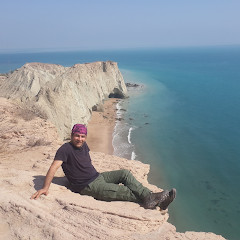
Photos
There are no photos for this place yet!
Reviews — 6

خوب

بسیار بسیار دیدنی

Great architecture

سیستم مدیریت اینجا برعکس عمل می کند، در ایام تعطیل که مردم فرصت بیشتری برای گشت و گذار دارند بسته است!

در روز های عید نوروز و تعطیلات باز نیست

"Ibn Sīnā" redirects here. For the mountain peak, see Lenin Peak.
Avicenna
Ibn Sīnā ابن سینا
Avicenna Portrait on Silver Vase - Museum at BuAli Sina (Avicenna) Mausoleum - Hamadan - Western Iran
Conventional modern portrait (on a silver vase, Avicenna Mausoleum and Museum, Hamadan)
Born c. 980
Afshona, Bukhara, Samanid Empire (now in present-day Uzbekistan)
Died June 1037
Hamadān, Kakuyid Emirate (Iran)
Residence
Samanid Empire
Ziyarid Tabaristan
Buyid Persia
Other names
Sharaf al-MulkHujjat al-HaqSheikh al-RayeesIbn-Sino (Abu Ali Abdulloh Ibn-Sino)Bu Alī Sīnā (بو علی سینا)
Academic background
Influences
HippocratesAristotleGalenNeoplatonismal-Kindial-FarabiRhazesAl-Birunial-MasihiAbul Hasan Hankari
Academic work
Era Islamic Golden Age
Main interests
Medicine Aromatherapy
Philosophy and logic
Kalām (Islamic theology)
Science Poetry
Notable works
The Book of Healing
The Canon of Medicine
Influenced
Al-Biruni Omar Khayyám Averroes Shahab al-Din Suhrawardi TusiIbn al-NafisIbn TufailAlbertus Magnus MaimonidesAquinasWilliam of OckhamAbu 'Ubayd al-JuzjaniEnlightenment philosophersHossein Nasr
This article contains Arabic text. Without proper rendering support, you may see question marks, boxes, or other symbols.
This article contains Persian text. Without proper rendering support, you may see question marks, boxes, or other symbols.
Portrait (1271)
Part of a series on
Avicenna
(Ibn Sīnā)
Works
The Book of Healing
The Canon of Medicine
Thoughts
Avicennism
On God's existence
Floating man
Al-Ghazali's criticism of Avicennian philosophy
Pupils
Abu 'Ubayd al-Juzjani
Bahmanyār
Ibn Abi Sadiq
Ali ibn Yusuf al-Ilaqi
Monuments
Avicenna Mausoleum
Avicenna (crater)
Bu-Ali Sina University
Avicenne Hospital
The Physician
The Physician (2013 film)
Avicenna Cultural and Scientific Foundation
Scholars Pavilion
vte
Avicenna (/ˌævɪˈsɛnə/; also Ibn Sīnā or Abu Ali Sina; Persian: ابن سینا; c. 980 – June 1037) was a Persian[4][5][6] polymath who is regarded as one of the most significant physicians, astronomers, thinkers and writers of the Islamic Golden Age. He has been described as the father of early modern medicine. Of the 450 works he is known to have written, around 240 have survived, including 150 on philosophy and 40 on medicine.
His most famous works are The Book of Healing, a philosophical and scientific encyclopedia, and The Canon of Medicine, a medical encyclopedia which became a standard medical text at many medieval universities and remained in use as late as 1650. In 1973, Avicenna's Canon Of Medicine was reprinted in New York.
Besides philosophy and medicine, Avicenna's corpus includes writings on astronomy, alchemy, geography and geology, psychology, Islamic theology, logic, mathematics, physics and works of poetry.
Avicenna
Ibn Sīnā ابن سینا
Avicenna Portrait on Silver Vase - Museum at BuAli Sina (Avicenna) Mausoleum - Hamadan - Western Iran
Conventional modern portrait (on a silver vase, Avicenna Mausoleum and Museum, Hamadan)
Born c. 980
Afshona, Bukhara, Samanid Empire (now in present-day Uzbekistan)
Died June 1037
Hamadān, Kakuyid Emirate (Iran)
Residence
Samanid Empire
Ziyarid Tabaristan
Buyid Persia
Other names
Sharaf al-MulkHujjat al-HaqSheikh al-RayeesIbn-Sino (Abu Ali Abdulloh Ibn-Sino)Bu Alī Sīnā (بو علی سینا)
Academic background
Influences
HippocratesAristotleGalenNeoplatonismal-Kindial-FarabiRhazesAl-Birunial-MasihiAbul Hasan Hankari
Academic work
Era Islamic Golden Age
Main interests
Medicine Aromatherapy
Philosophy and logic
Kalām (Islamic theology)
Science Poetry
Notable works
The Book of Healing
The Canon of Medicine
Influenced
Al-Biruni Omar Khayyám Averroes Shahab al-Din Suhrawardi TusiIbn al-NafisIbn TufailAlbertus Magnus MaimonidesAquinasWilliam of OckhamAbu 'Ubayd al-JuzjaniEnlightenment philosophersHossein Nasr
This article contains Arabic text. Without proper rendering support, you may see question marks, boxes, or other symbols.
This article contains Persian text. Without proper rendering support, you may see question marks, boxes, or other symbols.
Portrait (1271)
Part of a series on
Avicenna
(Ibn Sīnā)
Works
The Book of Healing
The Canon of Medicine
Thoughts
Avicennism
On God's existence
Floating man
Al-Ghazali's criticism of Avicennian philosophy
Pupils
Abu 'Ubayd al-Juzjani
Bahmanyār
Ibn Abi Sadiq
Ali ibn Yusuf al-Ilaqi
Monuments
Avicenna Mausoleum
Avicenna (crater)
Bu-Ali Sina University
Avicenne Hospital
The Physician
The Physician (2013 film)
Avicenna Cultural and Scientific Foundation
Scholars Pavilion
vte
Avicenna (/ˌævɪˈsɛnə/; also Ibn Sīnā or Abu Ali Sina; Persian: ابن سینا; c. 980 – June 1037) was a Persian[4][5][6] polymath who is regarded as one of the most significant physicians, astronomers, thinkers and writers of the Islamic Golden Age. He has been described as the father of early modern medicine. Of the 450 works he is known to have written, around 240 have survived, including 150 on philosophy and 40 on medicine.
His most famous works are The Book of Healing, a philosophical and scientific encyclopedia, and The Canon of Medicine, a medical encyclopedia which became a standard medical text at many medieval universities and remained in use as late as 1650. In 1973, Avicenna's Canon Of Medicine was reprinted in New York.
Besides philosophy and medicine, Avicenna's corpus includes writings on astronomy, alchemy, geography and geology, psychology, Islamic theology, logic, mathematics, physics and works of poetry.